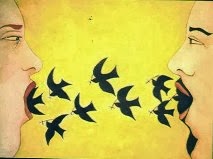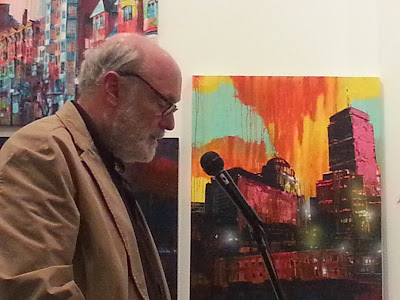The Shutting Door
Poems by Timothy Gager
Ibbetson Street Press
Somerville, MA
53 Pages
$11.00
Review by Dennis Daly
The art of creation needs a steady sober hand and a plethora of malleable materials readily available. Poets, who are naturals at breathing life into words, rarely have a problem with the latter of these two necessities. In fact most of their available materials must be isolated, contained, and, yes, even suppressed in order for these wordsmiths to perceive the shape and direction of what comes next.
Poet Timothy Gager knows how to construct his poems, compartment after compartment, stanza after stanza. He becomes the portal of existence between past and future. He personifies the solid but windowed barrier on the cover of his newest collection of poetry entitled The Shutting Door.
Early on Gager sets the optimistic but slightly ambiguous tone with the poem In My Hip High Waders. The protagonist tries something new—fly fishing. He’s looking towards a future that the sun gives him a glimpse of, but only a glimpse. The poet concludes his hopeful moments flashing through bright daylight this way,
No different today
than tomorrow but I need
a perfect cast; never fished
before; saw a picture of you
holding catch from hooked finger,
Hell, I’ve never thrown fly before,
attempted a roll cast, yet
knee high in the water
the sun to show me trout.
They disappear into shadows.
Note that before the shadows reassert their claim on reality the poet mines the past for his selective image of triumph, the fish on the hooked finger, and goes with it.
In the poem There’s Sunshine when You need It Gager’s persona reenters a past of addiction and wilted joys through different doors to offer someone or everyone a key to the future. The scene, both cool and detached, is not without pathos. Open doors, even intimate ones, do not always attract happiness. Here are some of the more gritty lines,
Wet cats and sick dogs,
sit on benches under newspapers,
their muscles clenched
in weak electrical currents
inducing dull pains in junkies.
I’ve offered a key to unlock
the lives jammed up.
I recall her door opened
to a bedroom with dead flowers
tipped on their sides…
Time’s door shuts on occasion, but never permanently. Looking past a door ajar the reader infers the history of love and lives lived from a rumpled bed and a familiar aroma. In the poem I have mostly Nightmares the poet explains,
…I wake to
your calf, it left a wrinkle
in my comforter;
a note; a funnel cloud,
destroyed everything,
you left the foundation,
the coffee maker brewing.
Not only does the title poem, The Shutting Door, encapsulate Gager’s methodology, it also juxtaposes some interesting moments of lightness and darkness. In this poet’s world, mankind both absorbs light and, when needed, emits light. Consider these lines at the heart of the piece,
we walked towards woods, the moss
cold under our toes, as we were,
caught in the light for a moment;
a glimpse of half full. We are dim
lights on dark nights, sending out calls
to the wolves howling at the sun
because the moon hanging there,
yet never seems to hear them.
If I should need to step back to see
how you glow in this light,
illumination, I can be at one with that…
Missteps, an odd claustrophobic poem set in its own compartment—an AA meeting, jumps off the page and demands an audience. The protagonist begins with honesty and ends in a church basement seeking a heaven of sorts. In between, his door to the past swings open to addiction and its metaphors. You get the feeling that too much honesty at one time can devolve into euphoria and doped-up degradation. Not exactly the desired outcome in the meeting or in the poem. I like this poem a lot. Gager opens with these lines of tragic comedy,
When I raised my hand
told a gray room the reasons
I started drinking, I wanted
to start again immediately.
Told people, whose faces looked like
The End of the World, the truth.
Then I told them I would pour a girl
I’d lusted after, down like whiskey…
With one repeated word the poet conveys a brave new world out of the blackest melancholy in the poem Seasonal Affective Disorder. The word is “instead.” Gager begins his piece by damning routine in a darkening season and portrays his persona as self-medicating. That said, a door has been shut on dire overreactions such as suicidal thoughts. The poet says,
instead I don’t wake
with a thought of placing a gun
against my temple how cool
it would feel—the air heavy
hanging from a rafter,
instead, I read the paper
‘bout a man on a highway,
who opened his car door
walked out, straight into
an 18 wheeler, it’s what he wanted…
Perhaps so! But I’d take the vicarious route and, instead, read about it in the newspaper, wondering how big the straw was that finally broke this unfortunate camel’s back.
The poem What Do Men Want (in response to Kim A.) easily stands on its own merit. It’s a terrific poem stripped of manners and coyness and caution. It is three parts libido, two parts caricature with a serious and surprising undertone. The protagonist seeks to erase himself and his blues in sex and cigarettes and scotch. He succeeds and another door closes. The poem ends in perfect pitch,
… my dark clouds don’t matter
by the time her thighs start pumping
all the sunshine out of me
so hot the world burns, hotter than hell.
If you like your poetry accessible and genuine going in and gothic and damn gritty getting out, you’ll like Gager.




















































